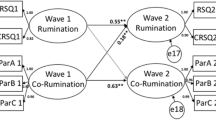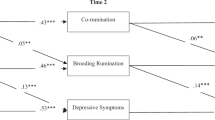Abstract
The college years are a time of significant upheaval, including changes in social relationships and dramatic increases in the development of depressive symptoms and alcohol-related problems. Research has identified that individuals’ tendencies to dwell on stressful events, both cognitively (rumination) and interpersonally (co-rumination), are independent risk factors for depressive symptoms and alcohol-related problems; however, pathways linking these processes are largely unexamined. The current study evaluated the tendency to focus excessively on problems in intra and inter-individual contexts and its relation to maladaptive outcomes in a diverse sample of college-aged emerging adults. Participants included 298 (73% female) undergraduate students who took part in an online survey. Students completed self-report questionnaires assessing co-rumination, rumination, depressive symptoms and alcohol-related problems. There was a significant indirect effect of co-rumination on both depressive symptoms and alcohol-related problems via its link to rumination. The current study adds to a growing literature demonstrating that overfocusing on problems within friendships may increase the likelihood of rumination, leading, in turn, to mental health and substance use problems among college-aged adults.

Similar content being viewed by others
Data Availability
All data utilized in the current study will be made available upon reasonable request.
Notes
We also examined this model without controlling for binge drinking. Results suggest the same pattern of findings. The model continued to fit the data well: χ2(df=3) = 3.60, p = .308; CFI = 1.00; TLI = 0.99; and RMSEA = .03 (90%CI = .00 to .13) and the indirect effect from co-rumination to alcohol-related problems through rumination remained significant: unstd. indirect effect = .02. SE = .01; 95% CI [.01 to .04], p = .005. The indirect effect from co-rumination to depressive symptoms through rumination also remained significant: unstd. indirect effect = .11, SE = .02; 95% CI [.07 to .15], p < .001.
References
Arterberry, B. J., Boyd, C. J., West, B. T., Schepis, T. S., & McCabe, S. E. (2020). DSM-5 substance use disorders among college-age young adults in the United States: Prevalence, remission and treatment. Journal of American College Health, 68(6), 650–657.
American College Health Association. (2009). National college health assessment-II: Reference group executive summary. Retrieved from http://www.achancha.org/reports_ACHA-NCHAII.html.
An, B. P., Loes, C. N., & Trolian, T. L. (2017). The relation between binge drinking and academic performance: Considering the mediating effects of academic involvement. Journal of College Student Development, 58(4), 492–508. https://doi.org/10.1353/csd.2017.0039
Anshel, M. H. (1995). Effect of chronic aerobic exercise and progressive relaxation on motor performance and affect following acute stress. Behavioral Medicine, 21(4), 186–196. https://doi.org/10.1080/08964289.1996.993375
Arnett, J. J. (2000). Emerging adulthood: A theory of development from the late teens through the twenties. American Psychologist, 55(5), 469–480. https://doi.org/10.1037/0003-066X.55.5.469
Baker, T. B., Piper, M. E., McCarthy, D. E., Majeskie, M. R., & Fiore, M. C. (2004). Addiction motivation reformulated: An affective processing model of negative reinforcement. Psychological Review, 111(1), 33–51. https://doi.org/10.1037/0033-295X.111.1.33
Bentler, P. M. (1990). Comparative fit indexes in structural models. Psychological Bulletin, 107(2), 238.
Blanco, C., Okuda, M., Wright, C., Hasin, D. S., Grant, B. F., Liu, S., & Olfson, M. (2008). Mental health of college students and their non-college-attending peers: Results from the national epidemiologic study on alcohol and related conditions. Archives of General Psychiatry, 65(12), 1429–1437. https://doi.org/10.1001/archpsyc.65.12.1429
Borsari, B., & Carey, K. B. (2001). Peer influences on college drinking: A review of the research. Journal of Substance Abuse, 13(4), 391–424. https://doi.org/10.1016/S0899-3289(01)00098-0
Bravo, A. J., Pilatti, A., Pearson, M. R., Mezquita, L., Ibáñez, M. I., & Ortet, G. (2018). Depressive symptoms, ruminative thinking, drinking motives, and alcohol outcomes: A multiple mediation model among college students in three countries. Addictive Behaviors, 76, 319–327. https://doi.org/10.1016/j.addbeh.2017.08.028
Butler, L. D., & Nolen-Hoeksema, S. (1994). Gender differences in responses to depressed mood in a college sample. Sex Roles, 30(5–6), 331–346. https://doi.org/10.1007/BF01420597
Calmes, C. A., & Roberts, J. E. (2008). Rumination in interpersonal relationships: Does co-rumination explain gender differences in emotional distress and relationship satisfaction among college students? Cognitive Therapy and Research, 32(4), 577–590. https://doi.org/10.1007/s10608-008-9200-3
Caselli, G., Bortolai, C., Leoni, M., Rovetto, F., & Spada, M. M. (2008). Rumination in problem drinkers. Addiction Research & Theory, 16(6), 564–571. https://doi.org/10.1080/16066350802100822
Ciesla, J. A., Dickson, K. S., Anderson, N. L., & Neal, D. J. (2011). Negative repetitive thought and college drinking: Angry rumination, depressive rumination, co-rumination, and worry. Cognitive Therapy and Research, 35(2), 142–150. https://doi.org/10.1007/s10608-011-9355-1
Cooper, M. L. (1994). Motivations for alcohol use among adolescents: Development and validation of a four-factor model. Psychological Assessment, 6(2), 117.
Cox, W. M., & Klinger, E. (1988). A motivational model of alcohol use. Journal of Abnormal Psychology, 97(2), 168–180. https://doi.org/10.1037/0021-843X.97.2.168
Denhardt, A. A., & Murphy, J. G. (2011). Associations between depression, distress tolerance, delay discounting, and alcohol-related problems in European American and African American college students. Psychology of Addictive Behaviors, 25(4), 595–604. https://doi.org/10.1037/a0025807
Felton, J. W., Cole, D. A., Havewala, M., Kurdziel, G., & Brown, V. (2019). Talking together, thinking alone: Relations among co-rumination, peer relationships, and rumination. Journal of Youth and Adolescence, 48(4), 731–743. https://doi.org/10.1007/s10964-018-0937-z
Grant, B. F., Goldstein, R. B., Saha, T. D., Chou, S. P., Jung, J., Zhang, H., Pickering, R. P., Ruan, W. J., Smith, S. M., Huang, B., & Hasin, D. S. (2015). Epidemiology of DSM-5 alcohol use disorder: Results from the National epidemiologic survey on alcohol and related conditions III. JAMA Psychiatry, 72(8), 757–766. https://doi.org/10.1001/jamapsychiatry.2015.0584
Gress-Smith, J. L., Roubinov, D. S., Andreotti, C., Compas, B. E., & Luecken, L. J. (2015). Prevalence, severity and risk factors for depressive symptoms and insomnia in college undergraduates. Stress and Health: Journal of the International Society for the Investigation of Stress, 31(1), 63–70. https://doi.org/10.1002/smi.2509
Hankin, B. L., Oppenheimer, C., Jenness, J., Barrocas, A., Shapero, B. G., & Goldband, J. (2009). Developmental origins of cognitive vulnerabilities to depression: Review of processes contributing to stability and change across time. Journal of Clinical Psychology, 65(12), 1327–1338.
Hankin, B. L., Stone, L., & Wright, P. A. (2010). Corumination, interpersonal stress generation, and internalizing symptoms: Accumulating effects and transactional influences in a multiwave study of adolescents. Development and Psychopathology, 22(1), 217–235. https://doi.org/10.1017/S0954579409990368
Hertzog, C., Van Alstine, J., Usala, P. D., Hultsch, D. F., & Dixon, R. (1990). Measurement properties of the center for epidemiological studies depression scale (CES-D) in older populations. Psychological Assessment: A Journal of Consulting and Clinical Psychology, 2(1), 64.
Hilt, L. M., Armstrong, J. M., & Essex, M. J. (2017). Rumination and moderators of multifinality: Predicting internalizing symptoms and alcohol use during adolescence. Journal of Clinical Child and Adolescent Psychology, 46(5), 746–753. https://doi.org/10.1080/15374416.2015.1070354
Hingson, R. W., Zha, W., Weitzman, E. R. (2009). Magnitude of and trends in alcohol-related mortality and morbidity among U.S. college students ages 18–24, 1998–2005. Journal of Studies on Alcohol and Drugs, July (Suppl 16): 12–20. Retrieved from http://www.collegedrinkingprevention.gov/statssummaries/snapshot.aspx. (accessed July 5, 2019).
Johnston, L. D., O’Malley, P. M., Bachman, J. G., Schulenberg, J. E., & Miech, R. A. (2015). National press release, “Daily marijuana use among U.S. college students highest since 1980.” (p. 15). University of Michigan News Service.
Judd, C. M., & Kenny, D. A. (2010). Data analysis in social psychology: Recent and recurring issues. In S. T. Fiske, D. T. Gilbert, & G. Lindzey (Eds.), Handbook of social psychology., Vol. 1, 5th ed. (pp. 115–139). Hoboken, NJ: John Wiley & Sons Inc. Retrieved from http://search.ebscohost.com/login.aspx?direct=true&db=psyh&AN=2010-03505-004&site=ehost-live.
Kabat-Zinn, J. (1990). Full catastrophe living: Using the wisdom of your body and mind to face stress, pain and illness. Delacorte.
Kuntsche, E., Kuntsche, S., Thrul, J., & Gmel, G. (2017). Binge drinking: Health impact, prevalence, correlates and interventions. Psychology & Health, 32(8), 976–1017. https://doi.org/10.1080/08870446.2017.1325889
Little, R. J. (1988). A test of missing completely at random for multivariate data with missing values. Journal of the American Statistical Association, 83(404), 1198–1202.
Little, R. J., & Rubin, D. B. (1989). The analysis of social science data with missing values. Sociological Methods & Research, 18(2–3), 292–326.
Lyubomirsky, S., & Nolen-Hoeksema, S. (1993). Self-perpetuating properties of dysphoric rumination. Journal of Personality and Social Psychology, 65(2), 339–349. https://doi.org/10.1037/0022-3514.65.2.339
Maddock, J. E., Laforge, R. G., Rossi, J. S., & O’Hare, T. (2001). The College Alcohol Problems Scale. Addictive Behaviors, 26(3), 385–398. https://doi.org/10.1016/S0306-4603(00)00116-7
Martinez, J. A., Sher, K. J., & Wood, P. K. (2014). Drinking consequences and subsequent drinking in college students over 4 years. Psychology of Addictive Behaviors, 28(4), 1240–1245. https://doi.org/10.1037/a0038352
McCallum, J., Mackinnon, A., Simons, L., & Simons, J. (1995). Measurement properties of the center for epidemiological studies depression scale: An Australian community study of aged persons. The Journals of Gerontology Series b: Psychological Sciences and Social Sciences, 50(3), S182–S189.
Meda, S. A., Gueorguieva, R. V., Pittman, B., Rosen, R. R., Aslanzadeh, F., Tennen, H., Leen, S., Hawkins, K., Raskin, S., Wood, R.M., Austad, C.S., & Pearlson, G. D. (2017). Longitudinal influence of alcohol and marijuana use on academic performance in college students. PLoS ONE, 12(3). Retrieved from http://search.ebscohost.com.proxy-um.researchport.umd.edu/login.aspx?direct=true&db=psyh&AN=2017-10978-001&site=ehost-live.
Messina, B. G., Tseng, A., & Correia, C. J. (2015). Measuring alcohol-related consequences and motives among students attending historically Black colleges and universities. Addictive Behaviors. https://doi.org/10.1016/j.addbeh.2015.02.004
Monk, R. L., & Heim, D. (2013). A critical systematic review of alcohol-related outcome expectancies. Substance Use & Misuse, 48(7), 539–557. https://doi.org/10.3109/10826084.2013.787097
Muthén, L. K., & Muthén, B. O. (2010). Mplus (version 6.1)[Computer software]. Muthén & Muthén.
National Institute on Alcohol Abuse and Alcoholism. (2018). Fall Semester—A Time for Parents to Discuss the Risks of College Drinking. Retrieved from https://www.niaaa.nih.gov/publications/brochures-and-fact-sheets/time-for-parents-discuss-risks-college-drinking.
Nolen-Hoeksema, S. (1991). Responses to depression and their effects on the duration of depressive episodes. Journal of Abnormal Psychology, 100(4), 569.
Nolen-Hoeksema, S. (2000). The role of rumination in depressive disorders and mixed anxiety/depressive symptoms. Journal of Abnormal Psychology, 109(3), 504–511. https://doi.org/10.1037/0021-843X.109.3.504
Nolen-Hoeksema, S., & Aldao, A. (2011). Gender and age differences in emotion regulation strategies and their relationship to depressive symptoms. Personality and Individual Differences, 51(6), 704–708. https://doi.org/10.1016/j.paid.2011.06.012
Nolen-Hoeksema, S., & Davis, C. G. (1999). “Thanks for sharing that”: Ruminators and their social support networks. Journal of Personality and Social Psychology, 77(4), 801–814. https://doi.org/10.1037/0022-3514.77.4.801
Nolen-Hoeksema, S., & Harrell, Z. A. (2002). Rumination, depression, and alcohol use: Tests of gender differences. Journal of Cognitive Psychotherapy, 16(4), 391–403. https://doi.org/10.1891/jcop.16.4.391.52526
Nolen-Hoeksema, S., & Jackson, B. (2001). Mediators of the gender difference in rumination. Psychology of Women Quarterly, 25(1), 37–47. https://doi.org/10.1111/1471-6402.00005
Nolen-Hoeksema, S., & Morrow, J. (1991). A prospective study of depression and post-traumatic stress symptoms after a natural disaster: The 1989 Loma Prieta earthquake. Journal of Personality and Social Psychology, 61, 115–121.
Nolen-Hoeksema, S., Stice, E., Wade, E., & Bohon, C. (2007). Reciprocal relations between rumination and bulimic, substance abuse, and depressive symptoms in female adolescents. Journal of Abnormal Psychology, 116(1), 198–207. https://doi.org/10.1037/0021-843X.116.1.198
Nolen-Hoeksema, S., Wisco, B. E., & Lyubomirsky, S. (2008). Rethinking rumination. Perspectives on Psychological Science, 3(5), 400–424.
Papageorgiou, C., & Wells, A. (2001). Metacognitive beliefs about rumination in recurrent major depression. Cognitive and Behavioral Practice, 8(2), 160–164.
Papageorgiou, C., & Wells, A. (2003). An empirical test of a clinical metacognitive model of rumination and depression. Cognitive Therapy and Research, 27(3), 261–273.
Papakostas, G. I. (2014). Cognitive symptoms in patients with major depressive disorder and their implications for clinical practice. Journal of Clinical Psychiatry, 75(1), 8–14. https://doi.org/10.4088/JCP.13r08710
Pedrelli, P., Borsari, B., Lipson, S. K., Heinze, J. E., & Eisenberg, D. (2016). Gender differences in the relationships among major depressive disorder, heavy alcohol use, and mental health treatment engagement among college students. Journal of Studies on Alcohol and Drugs, 77(4), 620–628. https://doi.org/10.15288/jsad.2016.77.620
Preacher, K. J., & Hayes, A. F. (2008). Asymptotic and resampling strategies for assessing and comparing indirect effects in multiple mediator models. Behavior Research Methods, 40(3), 879–891.
Radkovsky, A., McArdle, J. J., Bockting, C. H., & Berking, M. (2014). Successful emotion regulation skills application predicts subsequent reduction of symptom severity during treatment of major depressive disorder. Journal of Consulting and Clinical Psychology, 82(2), 248–262. https://doi.org/10.1037/a0035828
Radloff, L. S. (1977). The CES-D scale a self-report depression scale for research in the general population. Applied Psychological Measurement, 1(3), 385–401.
Rehm, J., Baliunas, D., Borges, G. L. G., Graham, K., Irving, H., Kehoe, T., Parry, C. D., Patra, J., Popova, S., Poznyak, V., Roerecke, M., & Taylor, B. (2010). The relation between different dimensions of alcohol consumption and burden of disease: An overview. Addiction, 105(5), 817–843. https://doi.org/10.1111/j.1360-0443.2010.02899.x
Reynolds, E. K., MacPherson, L., Tull, M. T., Baruch, D. E., & Lejuez, C. W. (2011). Integration of the brief behavioral activation treatment for depression (BATD) into a college orientation program: Depression and alcohol outcomes. Journal of Counseling Psychology, 58(4), 555–564. https://doi.org/10.1037/a0024634
Rose, A. J. (2002). Co-rumination in the friendships of girls and boys. Child Development, 73(6), 1830–1843. https://doi.org/10.1111/1467-8624.00509
Rose, A. J., Carlson, W., & Waller, E. M. (2007). Prospective associations of co-rumination with friendship and emotional adjustment: Considering the socioemotional trade-offs of co-rumination. Developmental Psychology, 43(4), 1019–1031. https://doi.org/10.1037/0012-1649.43.4.1019
Schoofs, H., Hermans, D., & Raes, F. (2010). Brooding and reflection as subtypes of rumination: Evidence from confirmatory factor analysis in nonclinical samples using the Dutch Ruminative Response Scale. Journal of Psychopathology and Behavioral Assessment, 32(4), 609–617. https://doi.org/10.1007/s10862-010-9182-9
Schweizer, K. (2010). Some guidelines concerning the modeling of traits and abilities in test construction. European Journal of Psychological Assessment, 26, 1–2.
Shults, R. A., Elder, R. W., Hungerford, D. W., Strife, B. J., & Ryan, G. W. (2009). Emergency department visits for alcohol-related unintentional traumatic injuries, United States, 2001. Journal of Safety Research, 40(4), 329–331. https://doi.org/10.1016/j.jsr.2009.06.001
Starr, L. R. (2015). When support seeking backfires: Co-rumination, excessive reassurance seeking, and depressed mood in the daily lives of young adults. Journal of Social and Clinical Psychology, 34(5), 436–457.
Steiger, J. H. (1990). Structural model evaluation and modification: An interval estimation approach. Multivariate Behavioral Research, 25(2), 173–180.
Substance Abuse and Mental Health Services Administration (2019). Behavioral Health Among College Students Information & Resource Kit. HHS Publication No. (SMA) 19–5052. Rockville, MD: Substance Abuse and Mental Health Services Administration.
Substance Abuse and Mental Health Services Administration (SAMHSA). 2015 National Survey on Drug Use and Health (NSDUH). Table 6.84B—Tobacco Product and Alcohol Use in Past Month among Persons Aged 18 to 22, by College Enrollment Status: Percentages, 2014 and 2015. Available at: https://www.samhsa.gov/data/sites/default/files/NSDUH-DetTabs-2015/NSDUH-DetTabs-2015/NSDUH-DetTabs-2015.htm#tab6-84b.
Treynor, W., Gonzalez, R., & Nolen-Hoeksema, S. (2003). Rumination reconsidered: A psychometric analysis. Cognitive Therapy and Research, 27(3), 247–259. https://doi.org/10.1023/A:1023910315561
Tucker, L. R., & Lewis, C. (1973). A reliability coefficient for maximum likelihood factor analysis. Psychometrika, 38(1), 1–10.
West, S., & Graham, C. W. (2001). Assessing the validity of College alcohol problem scale with African American undergraduates: Results of preliminary investigation. Journal of Alcohol and Drug Education, 46(3), 4–17.
White, M. E., & Shih, J. H. (2012). A daily diary study of co-rumination, stressful life events, and depressed mood in late adolescents. Journal of Clinical Child and Adolescent Psychology, 41(5), 598–610.
Willem, L., Bijttebier, P., Claes, L., Vanhalst, J., & Raes, F. (2014). The cross-temporal associations between rumination subtypes and substance use in adolescence: Exploring the moderating role of gender. Journal of Psychopathology and Behavioral Assessment, 36(1), 143–154. https://doi.org/10.1007/s10862-013-9373-2
Acknowledgements
The authors wish to acknowledge the help of Dr. Laura MacPherson in developing this manuscript.
Funding
The authors did not receive support from any organization or funders for the submitted work.
Author information
Authors and Affiliations
Contributions
Study conceptualization and design, data collection and analyses were performed by the first author. All authors contributed to the drafting of each version of the manuscript and all approved the final manuscript.
Corresponding author
Ethics declarations
Conflict of interest
The authors have no relevant financial or non-financial interests to disclose.
Ethical Approval
All procedures performed in the study were in accordance with the ethical standards of the institution and with the 1964 Helsinki Declaration and its later amendments.
Informed Consent
Informed consent was obtained from all individual participants included in the study.
Additional information
Publisher's Note
Springer Nature remains neutral with regard to jurisdictional claims in published maps and institutional affiliations.
Rights and permissions
About this article
Cite this article
Felton, J.W., Havewala, M., Myerberg, L. et al. Rumination and Co-Rumination and their Associations with Alcohol-Related Problems and Depressive Symptoms among College Students. J Rat-Emo Cognitive-Behav Ther 40, 388–405 (2022). https://doi.org/10.1007/s10942-021-00418-y
Accepted:
Published:
Issue Date:
DOI: https://doi.org/10.1007/s10942-021-00418-y




